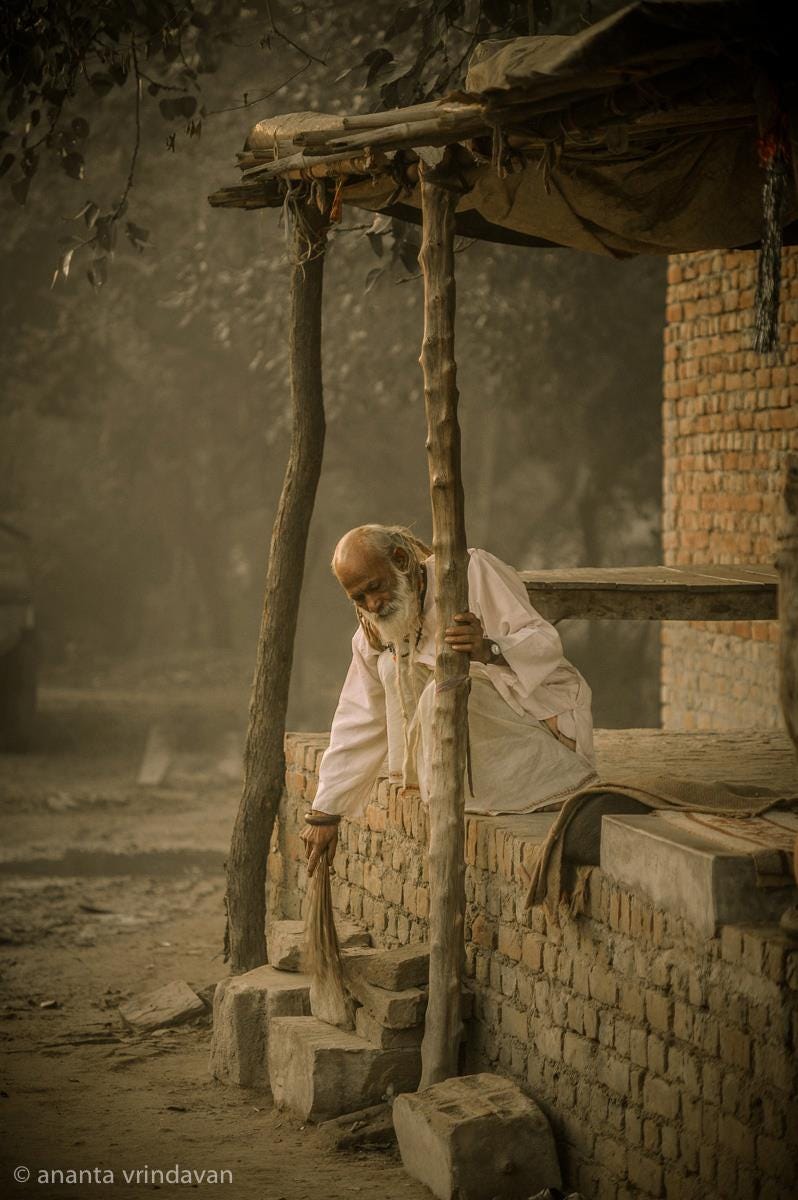Discovering Discomfort
Whether it’s the coldest pre-dawn hours of winter, or the staggering heat of May and June, the external conditions here are far from perfect. Along with the climatic attacks, there is noise, pollution, decrepit infrastructure… whatever you do and however you try, Vrindavana inevitably ushers you into some level of austerity. When hardships come, however, people here have learnt to grit their teeth, accept it with happiness, and carry on with enthusiasm. Some even actively embrace discomfort to deepen their spirituality. Either way, accepting or embracing it, austerity is a staple part of Vrindavana life. It’s a paradigm diametrically opposed to the ‘developed world,’ where we impulsively do anything and everything to escape austerity and discomfort. The concept of tolerating difficulty is fast disappearing from the modern dictionary.
The name “Sutapa” denotes “the person who performs great austerity.” Thankfully I was given the name “Sutapa Das,” denoting the *servant*of such illustrious personalities. That was a lifesaver indeed, because my capacity for voluntary hardship definitely has its limits. Observing the ascetic lifestyle of Vrindavana’s residents, however, is giving me a different perspective. If we perennially avoid discomfort and difficulty, frantically searching for immediate adjustments and relief, we’ll simply end up suffering more. Why so? Firstly, on a physical level it’s only a matter of time before we face certain hardships that we can’t side-step; if we’ve inadvertently cemented ourselves into an expectation that we can mitigate and avoid discomfort, we’ll find ourselves disturbed, frustrated and depressed when we encounter life’s inescapable difficulties. Secondly, on a mental level, voluntarily accepting austerity trains you to elevate your consciousness to something higher in order to deal with the discomfort. If we’ve never practiced that art, and never achieved that elevation, we’ll never really tune in to the sacred space of sanctuary beyond the inevitable material chaos. Thus, voluntary acceptance of hardship, what we call austerity, is something like a vaccination. It’s an intentional acceptance of pain, that eventually saves you from a whole lot more.
While the whole world may pity the ‘unfortunate’ hardships that spiritualists in holy places undergo, they may not realise that these personalities are several steps ahead of the game. They’re aware that this world is wired to be uncomfortable, and they know the preparation required to digest that inevitable reality. Vrindavana is therefore known as tapo-bhumi, “the land of austerity.” Interestingly, it’s also known as madhurya-dham, “the place of divine sweetness.” Sounds counterintuitive and contradictory. The paradox of Vrindavana, however, is that the austerity people perform here, frees them from the shackles of material consciousness and opens up a gateway to the eternal sweet reality of the spiritual world. Their future is bright, and my consciousness has been illumined. A little more divine austerity may well be the order of the day. I’m slowly discovering the benefits of discomfort.



This world isn't expecting the unexpected. Most of us in this material world do not have the understandingto be able to deal with another life...Every being would agree that being austere is a principle of wisdom for leadership, whether or not we reach our goals.... if we live an austere life at our homes we do not expect ourselves to be going very far...but austerity begins with accepting change... some changes fall upon us as heavy unmovable blocks...."those who attained sansar were at peace" how different is being austere from finding peace?